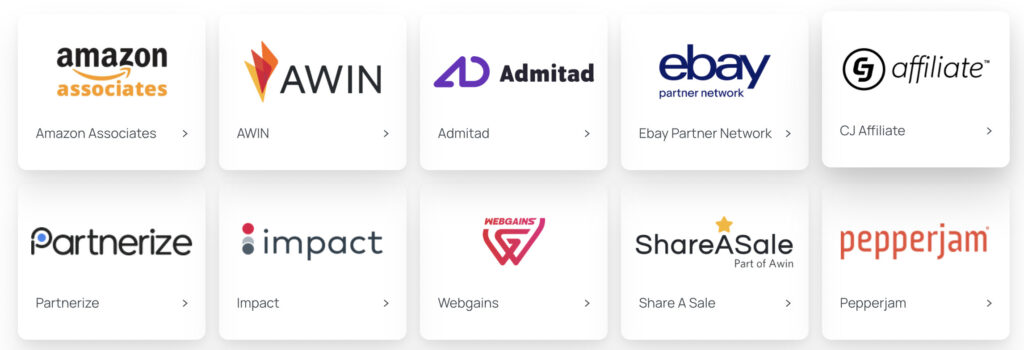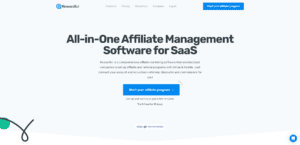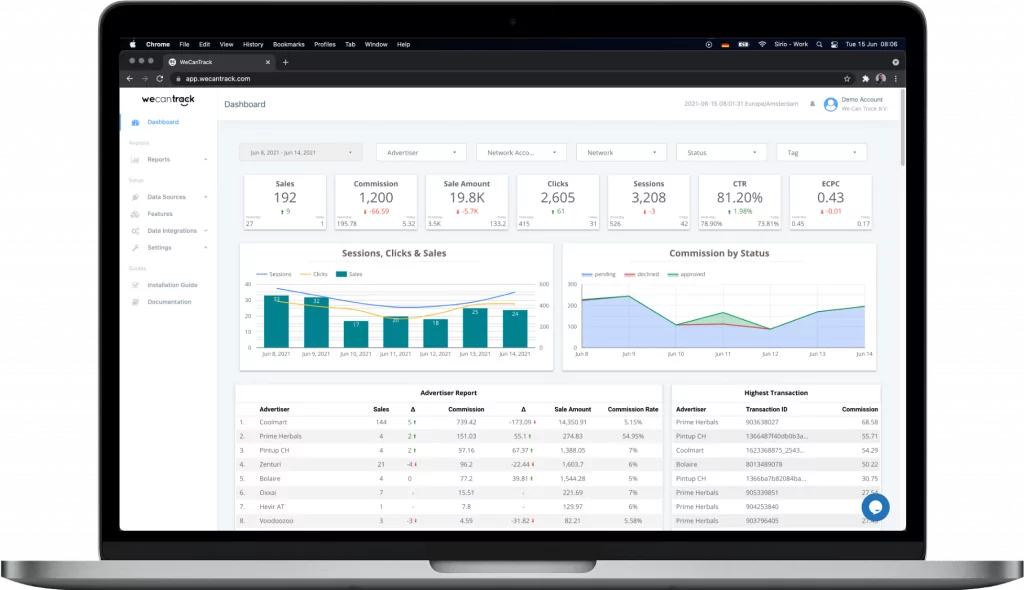What is affiliate management, and what are the benefits for businesses and affiliates?
Effective affiliate management is crucial because it ensures that merchants and affiliates work towards common goals, optimizing the performance of affiliate marketing campaigns.
Businesses can enhance their affiliate program’s effectiveness by fostering strong relationships, providing affiliates with the tools and information they need, and regularly communicating. This increases sales and revenue, boosts brand awareness, and expands market reach through the affiliates’ diverse platforms.
Furthermore, a well-managed affiliate program can attract top-tier affiliates, creating a cycle of success that benefits all parties involved.
Table of Contents
The Parties In Affiliate Management
Affiliates or publishers promote products or services sold by another party (e.g., brands or companies): the advertiser. This can be done in various ways, such as banners, links, text ads, and social media ads.
Promoting online products to interested customers is a way for affiliates to earn money by attracting traffic.
The advertiser sells the product or service and profits from the affiliates’ traffic. For them, affiliate marketing is a means of generating business without spending money on marketing.
An affiliate management system allows advertisers to manage their affiliate partners, from their affiliates’ accounts and registrations to the product/service inventory they offer for sale on each partnering website.
It can also include tools that integrate trends from the affiliates’ results in the affiliate marketing analytics, allowing the advertiser to look for up-and-coming opportunities or products to emphasize.
One of the most common forms of affiliate management is utilizing affiliate networks.
What Are Affiliate Networks?
Affiliate networks are large groups of affiliate programs associated with numerous companies. They act as intermediaries between affiliates and advertisers, making it easier for the advertiser to set up and run their affiliate program and attract affiliates to promote their offers.
The networks are responsible for, amongst others:
- Moderating each (new) affiliate
- Allowing them to join their network
- Ensuring that affiliate programs are safe for users and follow the rules set forth by accepting merchants
- Please keep track of metrics like clicks, sales, and commissions earned to report back to the affiliate marketers/website owners and the brand or merchant itself.
Their job is much more comprehensive than simply moderating affiliates. Still, this article will focus on the benefits and disadvantages of affiliating with a third-party agency versus handling it in-house using an affiliate management system (AMS).
An AMS allows advertisers who do not want to use a third-party service for monitoring to keep the affiliate management in their own hands and offer an affiliate program to control the process internally.
There are many different affiliate networks out there. Below, you can see just a few integrated into the wecantrack software. For a complete overview, please look at our integrated affiliate networks.
Examples of popular affiliate networks include:
CJ.com (Formerly Commission Junction)
Commission Junction was founded in 1998 by Lex Sisney and Per Pettersen, who sold it in 2003 to ValueClick – and changed its name to Conversant in 2014.
Alliance Data acquired Conversant in 2014 and placed it under the holding company Epsilon, which Alliance Data bought in 2004 for $300 million. And in 2019, Publicis Groupe acquired Epsilon in a $4.4 billion deal.
Despite several changes in ownership, CJ remains a leading affiliate network for over 3,800 global brands, and their technology powers a partnership between over 167K publishers and brands.
impact.com
impact.com was founded in 2008 by Per Pettersen (co-founder of Commission Junction), Todd Crawford (Vice President of Sales and first employee of Commission Junction), Roger Kjensrud, and Wade Crang. They aimed to disrupt the affiliate market and deliver unbiased data for marketers.
According to impact.com, they are not an affiliate network, although most merchants and affiliates regard them as an affiliate network.
“Unlike a network, we are not the middleman between the advertiser and their partners. Instead, we provide a robust marketplace with a large pool of leading affiliates, niche media partners, and non-traditional publishers.”
impact.com hosts over 2,500 affiliate programs.
FlexOffers.com
FlexOffers (previously known as CardOffers) was founded in 2008 by Alexander Daskaloff (CEO/Owner) and initially only served the credit card affiliate space.
Today, FlexOffers works with over 10,000 advertisers, 65+ networks and agencies, and over 75K publisher programs.
“We are a network of networks that serves as a one-stop-shop for those who value convenience.”
Affiliate links, payments, technology, and support services are all handled by one team.
Merchants laid the groundwork for affiliate marketing by wanting a new type of internet marketing channel that allowed them to track which promotions were generating sales and which were not.
For example, early email marketing software programs did not allow merchants to fully track which links were clicked and whether any sales were made after that click. Affiliate networks solve this issue, allowing merchants to easily track their affiliates’ activities and commissions.
What’s more, affiliate management platforms like these networks allow the affiliate and the advertiser to view all their channels in one place to spot, which brings in the most visitors, conversions easily, and, of course, money.
Affiliates can be very powerful for a brand or merchant since they typically develop a more personal attachment to the brand and its products than most other marketing channels.
This makes sense: a blogger who is enthusiastic about your service and, therefore, is promoting it in their content is a much more loyal, dedicated, and thus influential promoter than, say, impersonal campaigns on social media or in Google.
Affiliate marketing is a way for brands and merchants to generate business without spending money on advertising without results. You only pay after the promotion has delivered a specific result, like a sale.
This differs from advertising in search engines, where you must spend a lot of money to get people on your site.
Still, tracking the results of your campaigns and efforts remains crucial since it’s the only way to know what works and what doesn’t and to prioritize those campaigns and products that will bring your company the most significant growth.
So, what does an affiliate program do in tracking results?
An affiliate program or network is a system where merchants first sign up with the affiliate network and then will be connected with affiliates who can promote their products or services.
As we mentioned, it is the intermediary between the advertiser and the publisher.
The affiliate sends traffic to the merchant’s website through a link or banner. They are rewarded on a pre-defined basis, like for each click on one of their links, for each action someone they referred undertakes, or as a share of the revenue they ramp up for the advertiser.
The affiliate agreement will typically clarify what a merchant pays a particular affiliate when selling.
How Do You Find The Best Affiliates To Work With?
Affiliate management is easier and cheaper than you think. Affiliate recruitment and promotion are much more convenient than hiring a marketer or promoter on your team; the significant difference is that you’re dealing with people who work from home and don’t require an interview, benefits packages, etc.
When you use an affiliate network to manage your affiliates, they act as intermediaries and find people to promote your offers.
That is why many brands and merchants outsource affiliate recruitment and promotion to a third-party affiliate network or agency. The upside is that the management fees will be far less than if you decide to manage it yourself. Why not take advantage of their experience and reach?
These networks typically have many publishers lined up to promote your offers, which will spare you the time and effort to find them yourself.
Are there different affiliate networks for different types of brands and merchants?
Yes, affiliate networks cater to specific types of products or services. For example, some networks are designed specifically for fashion, travel, or SAAS affiliate programs, while others can handle everything from pet bedding to diaper deals.
If you find yourself in the affiliate marketing game, choose a company that specializes in what you are trying to promote.
What criteria do you use to determine whether or not an affiliate is a good fit for your business?
Finding affiliates with a proven track record of high conversion rates is significant for brands and merchants.
Some affiliate networks allow their clients’ brands and merchants to choose their affiliates based on the conversion rate, which means the brand or merchant can see who generates the most revenue before signing up.
If you don’t know, ask your affiliate network to provide you with some details and statistics about their affiliates.
How will you keep up with affiliate activity?
The best way to monitor your efforts’ performance is to find an affiliate network that offers reporting tools. These tools enable brands and merchants to track their affiliates’ clicks, sales, and commissions—often even in real time!
Most networks alert the affiliate and the brand or merchant when an affiliate account problem occurs, such as a password change or broken links.

Balancing diverse marketing tools while maintaining efficiency is a common struggle. Streamlining processes and investing in automation can pave the way for success.
Tips For Creating Attractive, Effective Affiliate Marketing Programs That Will Attract More Affiliates?
Even if you’re leveraging an affiliate network, you will want to grow your “army of affiliates” promoting your offers and products. Here are some tips to help you attract more people who are willing to promote your deals:
- Ensure your affiliate program is easy to understand: what do you want people to promote for you?
- Provide clear guidelines on what the affiliates can promote, where they can promote it, and how they should promote it. You might also consider providing promotional materials they can use
- Affiliates like receiving feedback, so make sure you’re always available if they need any help or have questions.
- You must be able to keep up with the program and any affiliate requests; otherwise, your brand or merchant might lose their trust.
- If you’re interested in recruiting top affiliates, you should offer the best commission rates possible. Make it as alluring as possible for them to promote your stuff!
- Provide easy tools for tracking and promoting all of your affiliate listings.
Why is it essential to have a unique affiliate link for each product you promote in the affiliate marketing program?
Each affiliate link should be unique, creating a different tracking cookie for your affiliates. This allows them to keep track of their sales and commissions. It also helps you determine which product performs well and should receive more effort.
A unique URL will stand out from the other affiliate links on your site, which will also help increase conversions since the affiliates won’t get confused about where they’re sending their traffic.
How do you determine what affiliate commission rates you should pay?
When deciding on affiliate commission rates, it’s important to remember that the commission rate largely depends on what you are promoting.
If you’re promoting a line of children’s clothing, 1% would be reasonable, while if you sell cars, 1% might not be enough for your affiliates. Also, software or subscription services tend to have higher commissions since they have much higher profit margins.
Best Affiliate Management Software
Many companies are implementing affiliate management solutions to use consumers as their marketers for their goods and services. This occurs at a time when customer purchase decisions are more influenced by public opinion.
Through affiliate programs, customers who use a business’s goods or services can receive compensation for making recommendations that result in a sale (on their websites or other platforms).
Merchants or vendors (also known as advertisers) can monitor the performance of these associates or partners. According to the most recent figures, affiliate marketing accounts for 16% of e-commerce revenues.
Which affiliate management tool is the best to use? Your search for the best affiliate management software will be aided by our top 6 list below:
#1. Refersion
Refersion has existed since 2014. Over 60,000 merchants use their software to process 614,000+ orders daily and manage 6.6+ million affiliates—over $366 million has been paid in affiliate commissions from $2+ billion in revenue.
#2. Rewardful
Rewardful was founded in 2017 by Kyle Fox and Brady Cassidy to offer SaaS companies an easy way to set up affiliate and referral programs. Today, over 200K affiliates help thousands of merchants grow their businesses.
#3. PartnerStack
With over 80,000 active partners, PartnerStack is the #1 platform dedicated to B2B SaaS. Since 2015, they have helped 400+ B2B SaaS companies turn partnerships into valuable acquisition channels.
#4. Kartra
Kartra is a Genesis Digital product that went live in April 2018. It contains affiliate management software and is an all-in-one ecommerce platform.
#5. LinkMink
LinkMink was founded in 2018 by Ky Palmer and Philip Alexander to serve SaaS companies that want to grow their revenue by adding an affiliate program.
#6. FirstPromoter
FirstPromoter was founded in 2017 by Cioaca Virgil and was the first referral-tracking tool built exclusively for SaaS and subscription companies. The software supports 190 currencies and can do conversions in 170 – exchange rates are updated daily, and you can apply a custom exchange fee.
Making The Smart Choice
Affiliate management can seem daunting, but it’s critical to any successful digital marketing strategy.
By partnering with the right affiliate network or agency, you can outsource much of the recruitment and promotion to experts who know what they’re doing.
And don’t forget – affiliates can be mighty allies for brands and merchants, so take advantage of everything they offer. Ready to launch your affiliate program?












